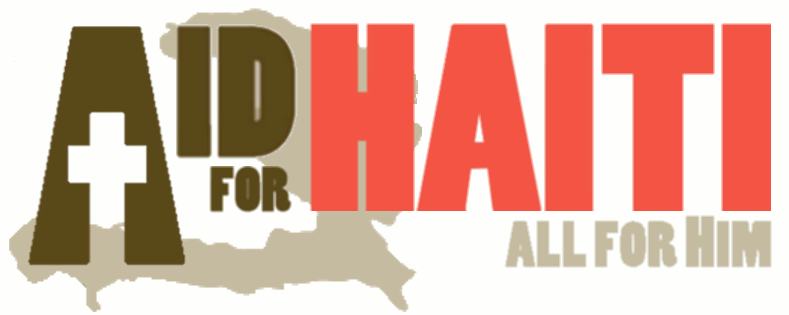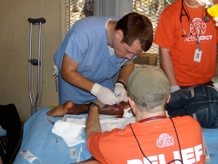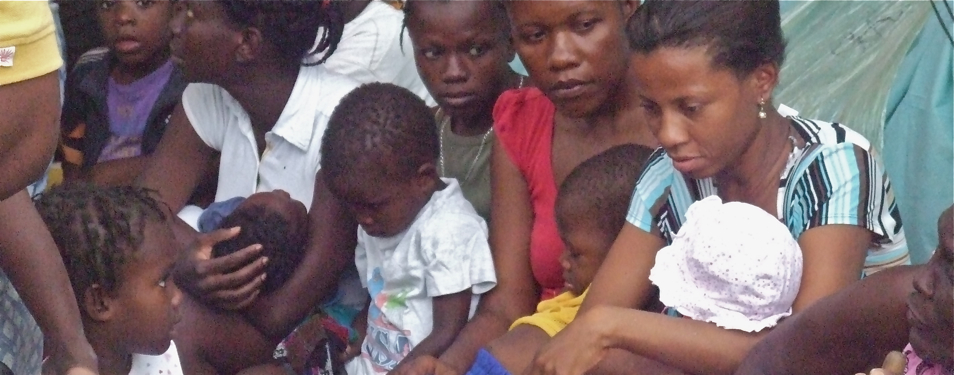The History of AFH and the Earthquake
Sarah Tenpenny
In 2006, a University of Tennessee medical student received a letter from a friend telling him of many Haitians living in the mountains with large growths on their necks. Interested in the condition and helping the Haitian people, he teamed up with two fellow students forming what was the very beginning of Aid for Haiti. After further investigation and research, AFH discovered the Haitian people were victims of iodine deficiency. The lack of a simple element that you and I find in our table salt causes devastating mental retardation in the Haitian children and large goiters in the adults. As we began treatment for this condition, we quickly realized that most of the Haitians in this area have little to no access to health care. Our hearts were broken, and we responded. Over the last 2 years, we have provided medical clinics in the rural mountains of southern Haiti, as well as, spiritual training for the local pastors. This training is often the first they have ever received. One pastor stated, “I am like a baker with no flour. I have church with people that look to me for instruction, but I have little myself.” We have slept in their houses, eaten at their tables, shared our hearts and love for Christ, and developed lasting relationships. And thus, we find our lives intertwined with the people of Haiti.
January 12, 2010, a 7.0 earthquake hits Port-au-Prince, Haiti. It’s late afternoon. Schools are finishing up, and people are getting off work. When suddenly, the earth begins to rumble. Buildings collapse. Power goes out. Thousands are dead. Others are screaming. And then, the sun goes down…I can’t imagine the hell the Haitian people experienced that night. In a single moment, their whole world was changed by a rare and unrecognizable event, as Haiti has not experienced an earthquake in over 200 years. After several days, we are able to make contact with our friends. All are alive; however, the impact of this disaster is taking its toll. Each day, we hear the growing fatigue in their voices as they work to gather, feed, and care for the survivors. After expending their own resources, our friends plead to us for help. They are exhausted, hungry, and in dire need of medicine.
Within 2 weeks of the earthquake, an AFH team is in Port-au-Prince. We are able to set up a makeshift clinic and distribute medical care, food, and water to our dear friends in PAP and Carrefour. A few days later, AFH moves on to Petit Goave, a town located near the epicenter of the earthquake. We begin to convert a ministry compound into a field hospital. Since the city hospital has been deemed unsafe, we assume responsibility of all care for the entire city. Overnight, Dr. Caleb serves as the only general doctor for a city of 150,000. “We are on our 5th delivery of the night; one person showed up dying of a simple asthma attack; and there seems to be a never ending line of new trauma sustained during the earthquake.” After only two hours of sleep, Dr. Caleb states, “God has blessed us though. It seems that every time we turn around, there is a new critical patient with a problem out of our scope, but we seem to have just the right medicine at just the right time. You can tell God is doing a wonderful thing here.” Even when overwhelmed, God has provided a way. Over the past two months, AFH has provided continuous medical care to the area of Petit Goave. We would never have been able to do this without the help of the Wesleyan Mission, multiple volunteer physicians, nurses, and EMTs, the Haitian nurses, Samaritan’s Purse, the American and Spanish Marines, as well as, you and your continued prayer and financial support. As the local hospital gets back running, AFH will begin its transition back to serving the people in rural Haiti. God has definitely opened many doors for AFH and we’re excited to see where He is leading and how we will be able to minister and share His love in the future.




Published by